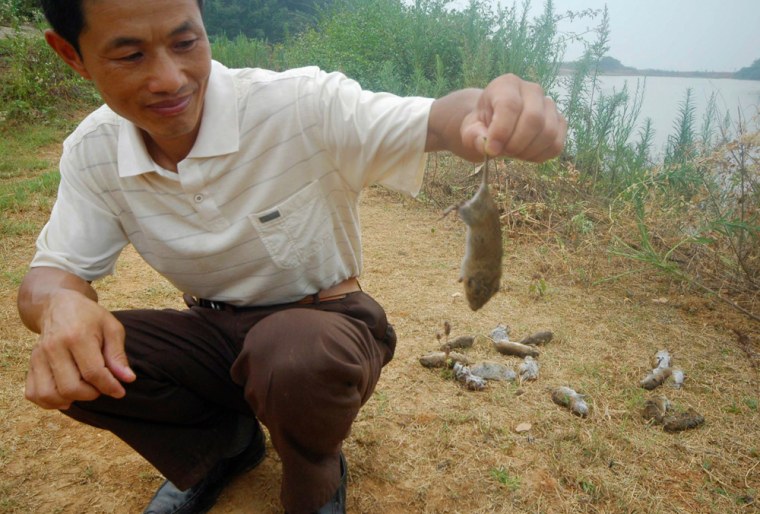Tired of fast food? Well, now you can travel to China and try some "pest food." As the country suffers from a plague of a reported 2 billion rats displaced by a flooded lake, many of the creepy creatures are being trucked from central China to the booming south to end up in fancy restaurant dishes, Chinese media reported.
Rats had been doing a roaring trade thanks to strong supply over the last two weeks, the China News Service quoted vendors as saying.
"Recently there have been a lot of rats... Guangzhou people are rich and like to eat exotic things, so business is very good," it quoted a vendor as saying, referring to the capital of Guangdong province, where people are reputed to eat anything that moves.
Some vendors, who declined to reveal their names, had asked people from a village in Hunan province, near Dongting Lake, to sell them live rats, the Beijing News said Monday.
"The buyers offered 6 yuan [79 cents] for a kilogram [2.2 pounds], but as to where they will sell the rats, they would not say," the newspaper quoted a local resident as saying, adding that villagers had to catch the rats alive.
Some Guangdong restaurants were promoting "rat banquets," charging 136 yuan ($18) for one kilogram of rat meat, the newspaper said.
But the restaurants denied their rats came from Hunan.
Local governments in Hunan have been grappling with the rats, which had already destroyed 6,200 square miles of crops and could spread disease, according to media reports.
A lack of snakes, also a popular dish in the south, and owls, a traditional Chinese medicine, was held partly responsible.
Scientists have also blamed China's massive Three Gorges Dam project and climate change for the Hunan rodents' flight to dry land.
So apparently the solution boils down to: If you can't beat them, eat them.
Not-so-bad ideas
- Here's more from the funky-food front: A mayor in eastern Germany has filed charges against workers at his local zoo for shooting animals and selling them as meat.
A spokeswoman for the mayor's office said deer were among the animals killed and sold by workers at Erfurt Zoo without permission over a number of years.
"The case is now with the state prosecutors," said the spokeswoman, declining to give further details.
The German Animal Protection League demanded a review of controls at the zoo and at all other institutions with animals in the state of Thuringia.
"We are worried this is only the tip of the iceberg," said Wolfgang Apel, president of the League, who also said the case raised serious questions about the zoo's management.
Die Zeit newspaper quoted an anonymous zoo employee as saying the number of animals had been declining and: "It is high time something is done about it."
Erfurt Zoo, home to lions, elephants and giraffes as well as horses, donkeys, sheep and goats, declined to comment.
So if you're vacationing in Germany this summer and your bratwurst tastes a bit gamey, now you know why.
According to the Daily Times of Pakistan, a Japanese spa has opened special baths meant to resemble ramen, complete with bath salt shaped like the pasta, a huge pair of chopsticks overhead and water giving off the aroma of pepper.“The aroma of pepper is said to have the effects of refreshing your mind, warming your burned-out heart and inflaming your passion,” the report quoted the spa complex Hakone Kowakien Yunessun, one of Japan’s most popular hot-spring resorts.Ramen lovers in bathing suits are turned into ingredients in the broth, jumping into the three tubs shaped like soup bowls.Hakone Kowakien Yunessun has offered a variety of creative baths including some filled with wine and coffee. Last year it came up with one resembling curry.We can't wait for the chocolate-fondue jacuzzi, but we're guessing that's going to get a little messy.
